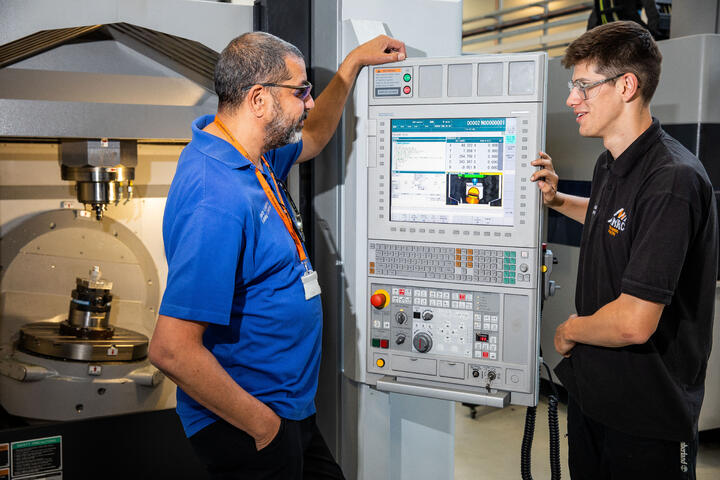Addressing future skills gaps
24 March 2021The University of Sheffield Advanced Manufacturing Research Centre (AMRC) and the AMRC Training Centre are part of an exciting new project to develop high-quality modular courses focused on upskilling employees to help address future skills gaps in key sectors such as manufacturing and engineering.
The High Value Manufacturing (HVM) Catapult, of which the AMRC and Nuclear AMRC are a part, has been appointed by the Department for Education (DfE) to lead the pilot scheme which will start in March 2021.
In January, the government announced its Skills for Jobs White Paper which set out plans to transform the future of further and technical education in England. This included looking at how to support more people to study more flexibly and to gain the skills that employers need in the future. The project will support this work by using the technological and industrial know-how of the HVM Catapult to understand the future skills needed for UK manufacturing.
The AMRC Training Centre sits alongside the AMRC and Nuclear AMRC in South Yorkshire. In March, it was recognised as ‘the centre of excellence for engineering and manufacturing apprenticeships’ as it was named training partner of the year by industry leaders at the Enginuity Skills Awards.
This collaboration will pave the way to ensure employers have access to the high quality-talent pipeline they will need to thrive.
“Investment in cutting-edge skills is at the heart of our plan to reform technical education, supporting people to get the skills our economy needs as we build back better from the pandemic,” said Education Secretary Gavin Williamson.
“This project will address the skills needed to level up productivity and drive economic growth across the country. I am delighted that this collaboration with the HVM Catapult, Institutes of Technology and Enginuity will deliver the skills needed in manufacturing both now and in the future and pave the way to ensure employers have access to the high quality-talent pipeline they will need to thrive.”
Working alongside Institutes of Technology – unique collaborations between employers, universities, and colleges – the HVM Catapult will develop cutting-edge training content, focusing on new and emerging technologies such as robotics and artificial intelligence (AI), additive manufacturing, and composite materials.
IoTs offer higher technical STEM education and training (mainly at Levels 4 and 5) in key sectors such as digital, construction, advanced manufacturing and engineering. They will be uniquely placed to deliver these courses to enable UK businesses – large and small – to ensure their workforce is equipped with the skills of tomorrow and able to better exploit emerging technologies.
There are longstanding skills issues that need addressing to ensure the continued global competitiveness of UK manufacturing.
Dick Elsy, CEO of the HVM Catapult, said: “There are longstanding skills issues that need addressing to ensure the continued global competitiveness of UK manufacturing. By using the HVM Catapult’s knowledge of cutting-edge innovation to build training for the manufacturing workforce, the Emerging Skills Project has the potential to transform the sector. We are extremely proud to partner with the Department for Education, Enginuity and Institutes of Technology to deliver a technical training system ready for the technologies of tomorrow’s factories.”
To assist in delivery of the project and increase sector-wide engagement in this project and process development, The HVM Catapult will be working in a partnership with the employer-led engineering skills body Enginuity.
Ann Watson, CEO of Enginuity, added: “We are very pleased to be working alongside the HVM Catapult in this important project to deliver higher technical training modules for upskilling the manufacturing workforce as part of the post-COVID recovery. Initiatives like this will inform the future direction of apprenticeship and technical qualification provision that will be crucial to upskilling and reskilling the manufacturing workforce in new technologies whilst also driving interest in new manufacturing jobs.”
The pilot will run from March to December 2021 with potential rollout thereafter on a national scale.

